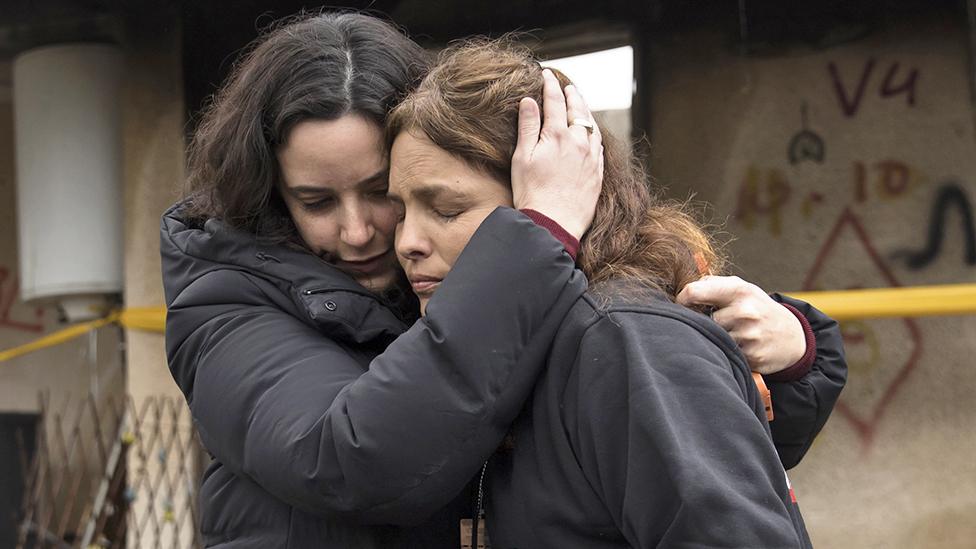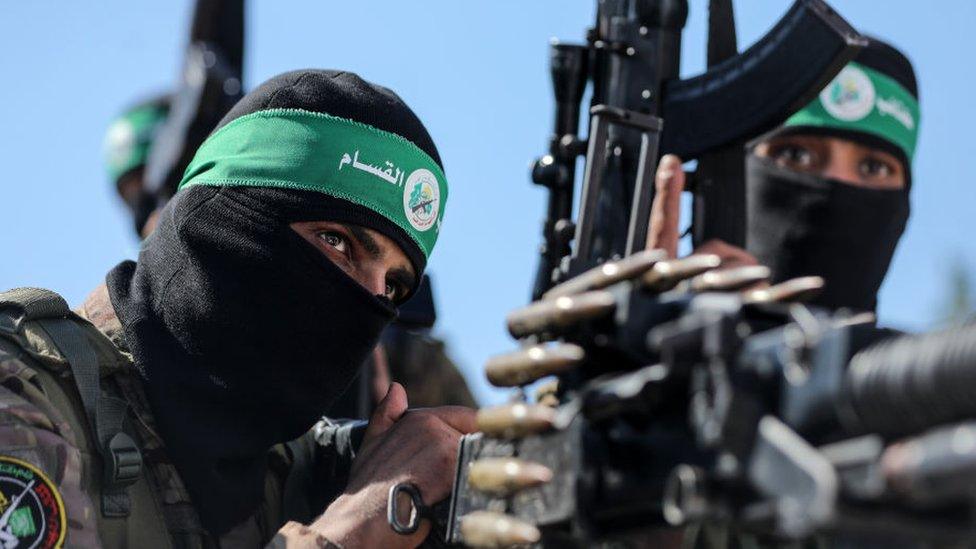US vetoes call for immediate Gaza ceasefire at UN
- Published
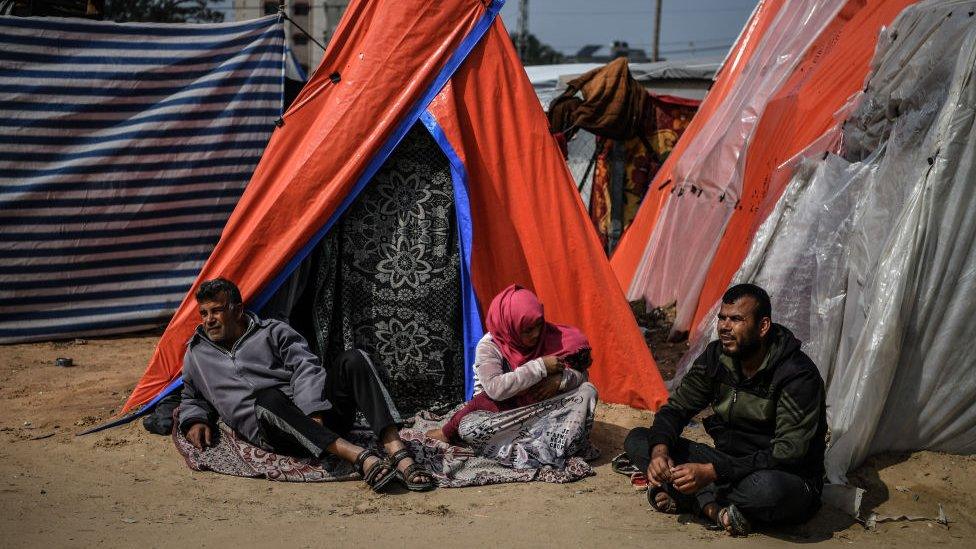
Rafah is sheltering more than a million people who have been forced to flee other parts of the Gaza Strip
The US has vetoed a resolution at the UN demanding an immediate ceasefire in Gaza after proposing its own draft urging a temporary ceasefire.
Washington said the Algerian-proposed resolution would "jeopardise" talks to end the war.
But the move has been condemned, with US allies expressing regret the original ceasefire motion was blocked by the White House.
In its own resolution the US warned Israel not to invade the city of Rafah.
The US has previously avoided the word "ceasefire" during UN votes on the war, but President Joe Biden has recently made similar comments.
Thirteen countries on the 15-member body backed Algeria's resolution, while the UK abstained.
Linda Thomas-Greenfield, Washington's ambassador to the UN, said it was not the right time to call for an immediate ceasefire while negotiations between Hamas and Israel were continuing.
The draft resolution proposed by the US calls for a temporary ceasefire "as soon as practicable" and on the condition that all hostages are released, as well as urging barriers on aid reaching Gaza to be lifted.
However, it is unclear if or when the Security Council will vote on the form of words proposed by Washington.
After the US vetoed Algeria's ceasefire resolution, the north African nation's envoy to the UN said it "would have sent a strong message to Palestinians" and declared that "unfortunately the Security Council failed once again."
"Examine your conscience, how will history judge you," Amar Bendjama said.
Palestinian representative to the UN Riyad Mansour said the US veto was "absolutely reckless and dangerous".
Heavy criticism also came from a series of Israeli and US allies. France's representative, Nicolas de Rivière, expressed regret that the resolution was "not adopted given the disastrous situation on the ground".
But Israel's Prime Minister Benjamin Netanyahu said he was "committed to continuing the war until we achieve all of its goals". "There is no pressure, none, that can change this," he added.
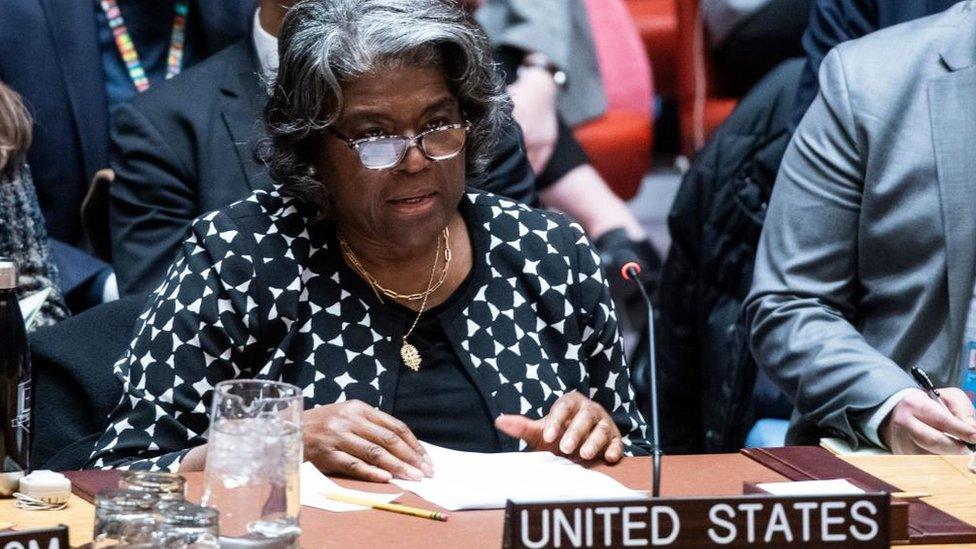
Linda Thomas-Greenfield said it was not the right time to call for an immediate ceasefire
Washington has come under immense international pressure to use its leverage to rein in Israel's devastating operations, having spent much of the war emphasising its ally's right to self-defence.
Israel would be bound to follow any Security Council resolution, as these are legally binding. This issue distinguishes the Security Council from the General Assembly.
It is the first time the US has called for a temporary ceasefire in Gaza at the UN, having vetoed previous resolutions using the word.
Frank Lowenstein, who served as US special envoy for Middle East peace under President Obama, called the move "a pretty significant shift" in American policy.
"What I think is most significant is what this says about the frustration level the Biden administration has with Prime Minister Netanyahu and the Israeli government," he told the BBC World Service. "They've just consistently ignored us when it comes to humanitarian assistance, reducing civilian casualties and now they are dug in on this Rafah invasion that we are strongly counselling against."
Mr Lowenstein also noted that President Biden is under pressure from Arab-Americans to do more to halt the killings of Palestinians.
A former Israeli ambassador to the US said the American ceasefire resolution "is going to be a problem for the Israeli government".
Michael Oren told BBC Newshour a key issue was any temporary ceasefire linked to talks on hostages releases would give "immense leverage to Hamas", who could then "drag out those negotiations" indefinitely.
"Any Israeli government would not meet those terms, it would mean Hamas wins the war and Israel loses," he said.
The US draft resolution states that a major ground offensive in Rafah would result in more harm to civilians and their further displacement, including potentially into neighbouring countries - a reference to Egypt.
It also says such a move would have serious implications for regional peace and security.
More than a million displaced Palestinians, who represent about half of Gaza's population, are crammed into Rafah after being forced to seek shelter there. The southern city, which borders Egypt, was home to only 250,000 people before the war.
Many of the displaced are living in makeshift shelters or tents in squalid conditions, with scarce access to safe drinking water or food.
The UN has issued its own warning that a planned Israeli offensive in the city could lead to a "slaughter". Its aid chief says civilians in Rafah, "like the entire population of Gaza, are the victims of an assault that is unparalleled in its intensity, brutality and scope".
The UN says women and children continue to be killed in air strikes. The Israeli military has previously insisted it only targets Hamas fighters.
Israeli war cabinet member Benny Gantz has warned the manoeuvre will be launched unless Hamas frees all its hostages by 10 March. The date marks the start of Ramadan, the Islamic holy month of fasting.
Israel launched its operations in Gaza following an attack by Hamas gunmen on southern Israel on 7 October, during which about 1,200 people were killed and more than 240 others taken hostage.
The Israeli military campaign has killed 29,000 people in the Palestinian territory, according to the Hamas-run health ministry there.
Related topics
- Published19 February 2024
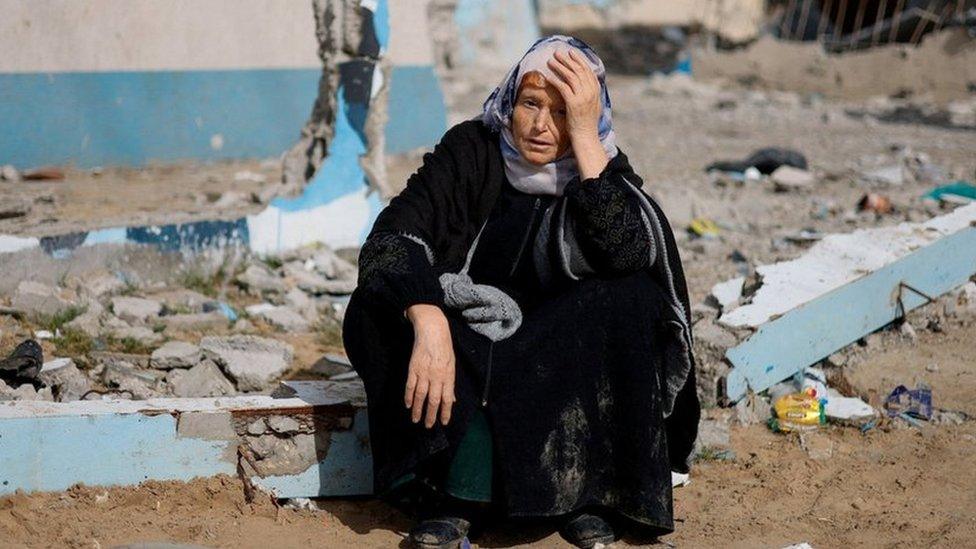
- Published20 February 2024
